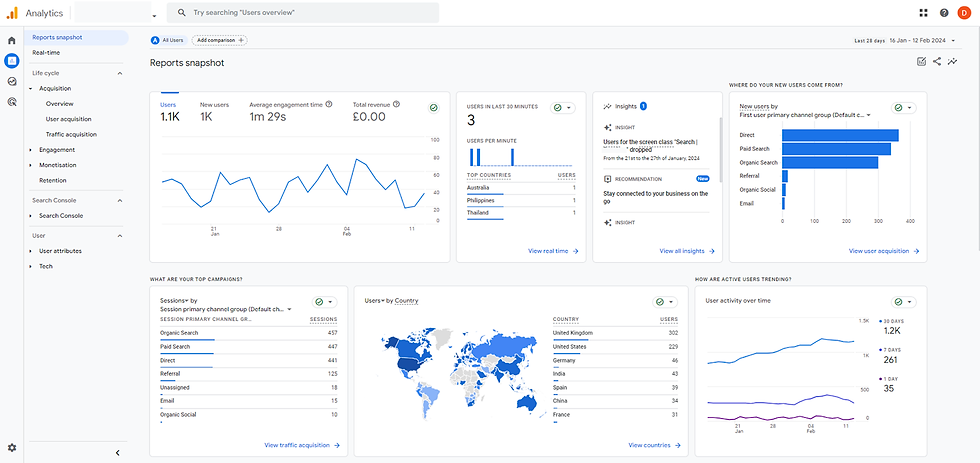Google Analytics Training: Understanding GA4 and How to Use It Effectively
- Magnos Somnia Training
- Jul 16, 2025
- 4 min read

The shift from Universal Analytics (UA) to Google Analytics 4 (GA4) has changed how marketers and businesses track user behaviour online.
Whether you’re a beginner or an experienced marketer, investing time in Google Analytics training is crucial to understand the new features, reporting methods, and event-based tracking system.
This article will guide you through what GA4 is, why it’s different from UA, and how to use its key features effectively.
What Is GA4 and Why Did Google Replace Universal Analytics?
GA4 is Google’s latest analytics platform, designed to give a more accurate view of user behaviour across devices and platforms.
Unlike Universal Analytics, which focused on sessions and pageviews, GA4 is built around events and user interactions, making it better suited for today’s multi-device browsing habits.
Key differences between GA4 and UA:
Event-Based Tracking – Every interaction (click, scroll, video play, purchase) is treated as an event, allowing for deeper insights.
Cross-Platform Tracking – GA4 can track users across websites and mobile apps in a single property.
Predictive Analytics – GA4 uses machine learning to predict potential outcomes, such as purchase probability.
Privacy-Focused – GA4 is designed with GDPR and cookie restrictions in mind, relying less on third-party cookies.
Why Google Analytics Training Is More Important Than Ever
Many marketers who were comfortable with Universal Analytics find GA4 challenging because reporting works very differently. Proper Google Analytics training helps you:
Understand the New Reporting Model – Metrics like bounce rate, session duration, and pageviews work differently in GA4.
Track the Right Events – Knowing how to set up custom events ensures you collect meaningful data.
Analyse User Journeys – GA4’s “Explorations” allow for in-depth analysis of how users move through your site or app.
Interpret Predictive Metrics – GA4 can estimate revenue potential, churn probability, and other forward-looking metrics.
Without training or a solid understanding, businesses risk misreading reports or missing valuable insights.
Essential GA4 Features You Should Master
1. Event Tracking and Conversions
GA4 automatically tracks certain events (page views, scrolls, outbound clicks), but you can create custom events for key actions like form submissions or purchases.
Example: You can track when users spend more than 3 minutes on a page or when they click a specific call-to-action button.
Conversions are now event-based, so understanding how to mark important events as conversions is essential.
2. Explorations (Advanced Reporting)
The Explorations tool allows you to create custom, interactive reports. You can:
Analyse user paths to see how visitors navigate your site.
Compare different audience segments, like first-time vs. returning users.
Identify pages where users drop off before completing a conversion.
3. Audience Building & Predictive Metrics
GA4 uses machine learning to predict user behaviour. For example:
Purchase Probability – Users most likely to buy in the next 7 days.
Churn Probability – Users likely to disengage soon. This helps marketers target the right audience with personalised campaigns.
4. Traffic Acquisition Reports
Traffic reports are still crucial, but GA4 uses a different categorisation system. You’ll learn to:
Distinguish between channels, sources, and mediums.
Track UTM-tagged campaigns for more accurate attribution.
Understand the impact of direct traffic, which often skews analytics if not properly managed.
Common GA4 Challenges (and How Training Solves Them)
Marketers moving to GA4 often face these challenges:
Confusing Interface – Reports are organised differently compared to UA.
Data Sampling – GA4 sometimes samples data for large datasets, which can be misinterpreted.
Missing Old Metrics – Bounce rate works differently, and “time on page” has been replaced with engagement-based metrics.
Proper Google Analytics training explains these changes and teaches how to read GA4 reports correctly.
The Future of Analytics Is Event-Based
GA4 reflects a major shift in how businesses track and analyse user behaviour. As privacy laws evolve and cookies disappear, GA4’s event-based tracking and machine learning predictions will become even more valuable.
Learning GA4 now ensures you can interpret data accurately, optimise marketing campaigns, and make data-driven decisions in the years to come.
Key Takeaways
GA4 is event-based, privacy-friendly, and cross-platform.
Understanding GA4 requires learning a new way of thinking about analytics.
Training can help you master event tracking, custom reports, and predictive insights.
The sooner you understand GA4, the sooner you can use it to improve marketing ROI.
Frequently Asked Questions About Google Analytics Training
1. What is Google Analytics 4 (GA4)? GA4 is the latest version of Google Analytics, focusing on event-based tracking instead of sessions and pageviews. It helps businesses track user behaviour across websites and apps while complying with modern privacy regulations.
2. Why is Google Analytics training important? Training helps marketers understand GA4’s new reporting structure, set up accurate event tracking, build custom reports, and interpret predictive analytics correctly, ensuring better data-driven decisions.
3. What’s the difference between GA4 and Universal Analytics? GA4 uses event-based tracking, cross-platform measurement, and predictive analytics, while Universal Analytics focused mainly on sessions and pageviews.
4. Can I track conversions and sales in GA4? Yes. GA4 lets you mark key events, like purchases or form submissions, as conversions. You can also track user journeys leading to those conversions.
5. Is Google Analytics 4 hard to learn? GA4 has a steeper learning curve than Universal Analytics, but with proper training, you can quickly master custom events, reporting, and audience insights.

Comments